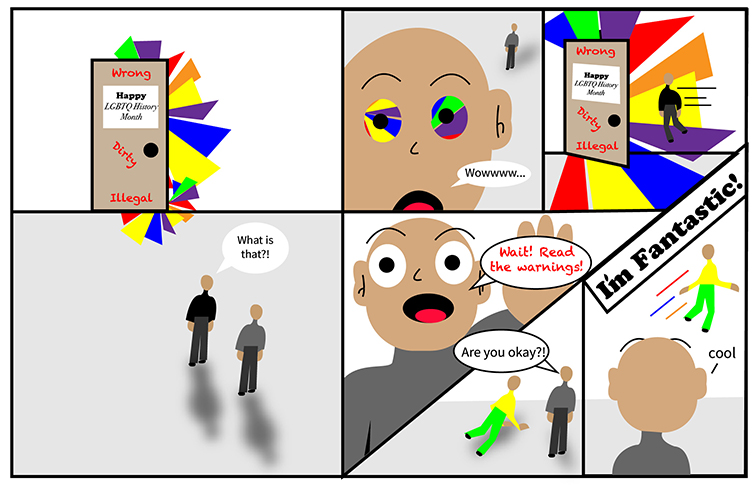Why LGBT Pride and History Months matter in an evolving society
“If you can’t love yourself, how the hell are you going to love somebody else?” said RuPaul Charles, drag icon, during his 2018 Emmy acceptance speech for “Outstanding Reality-Competition Program.”
That night “herstory” was made by Charles when his show “RuPaul’s Drag Race,” which airs on VH1, won two Emmys. From drag culture being on a mainstream television network to an Olympic medalist becoming a transgender icon to gay terminology being used in popular music.
This can only mean one thing, and that is the LGBTQ+ community is being further accepted by society. Although, the recent spotlight of queer culture has been an informative introduction; more recognition is needed for continued education until all aspects of the community feel included.
June is designated as LGBT Pride Month, which is a time to recognize the impact those in the LGBTQ+ community have made on society. Additionally, LGBT History Month in October focuses on those who have fought for equal rights and those who are coming out.
Cities large and small recognize LGBT Pride Month by showcasing their support through citywide festivals and parades. So why, four months later, does October need to be recognized as a second LGBTQ+ related observance?
Stonewall Inn, a New York City gay bar, was the site of the Stonewall riots in June 1969. Gay bars were supposed to be a safe haven for those who are considered to be different. At that time in New York, it was illegal for a person to wear less than three gender-appropriate articles of clothing, or participate in gay behavior (holding hands and kissing in public with a person of the same-sex).
It was how the police handled the removal of bar patrons and employees from the establishment that June morning that led to a five day riot demanding equality. The events of Stonewall led to the creation of gay rights organizations including the Human Rights Campaign and GLAAD. In 2006, President Barack Obama named the Stonewall Inn and the street it resides on, Christopher Street, a national monument for recognizing gay and human rights.
As the years progressed from the events of 1969, the LGBTQ+ community has grown larger and more vocal on how they want to be included in society. Fast forward decades later, the continuation of the June pride celebration has opened the conversation on a larger platform and not confined to the closed doors of gay bars. It has been important to continue the growth of LGBT Pride Month because equal is making leeway, but the road is still bumpy. June has become a platform for activists to speak on limitations that affect the community.
In the final days of LGBT Pride Month, the Supreme Court announced June 26, 2015, same-sex marriage to be recognized in all 50 states. The positive outcome of the June celebration carried the conversation throughout the year.

Oct. 11 is “National Coming Out Day,” which is a day to give a voice to those who may have felt alone when announcing their sexual orientation. The significance of the date is the 1987 National March on Washington for Lesbian and Gay Rights.
Today, youth are becoming the frontline of change. They are becoming more bold and unapologetic when standing up for what they believe in. School is meant to be a safe haven for students, but in the social media world we live in, those who are different aren’t always understood.
In 2010, a student decided to take action on behalf of those who are bullied for being different. The third Thursday in October is recognized as “Spirit Day,” to stand up against bullying. The two celebratory dates in October have fallen within LGBT History Month. “History” is the keyword here. Without those who have previously walked the path of change, today’s youth may not have the freedom they do now.
Since the talk of equality and acceptance has been less of a taboo and more of a topic, the community still faces uncertain times. President Donald Trump recently announced he may repeal some of the transgender laws established by President Obama.
The plan would legally define a person as either male or female and unchangeable at birth, and would basically erase civil rights protection for trans people in housing, schools, the workplace and healthcare. The trans community is one of the most vulnerable in our society, and it is important that we continue to be vocal during and after our months of celebration and observance.
Mainstream media is becoming more welcoming to queer culture, and winning awards in doing so. Learning from past movements, outlets like primetime television shows have now become more inclusive and showcasing the new normal.
As long as we keep the conversation alive by relying on our platforms to voice our views. We could use the education learned over the June and October months until all of the LGBTQ+ community can feel the love and acceptance by society year round.

